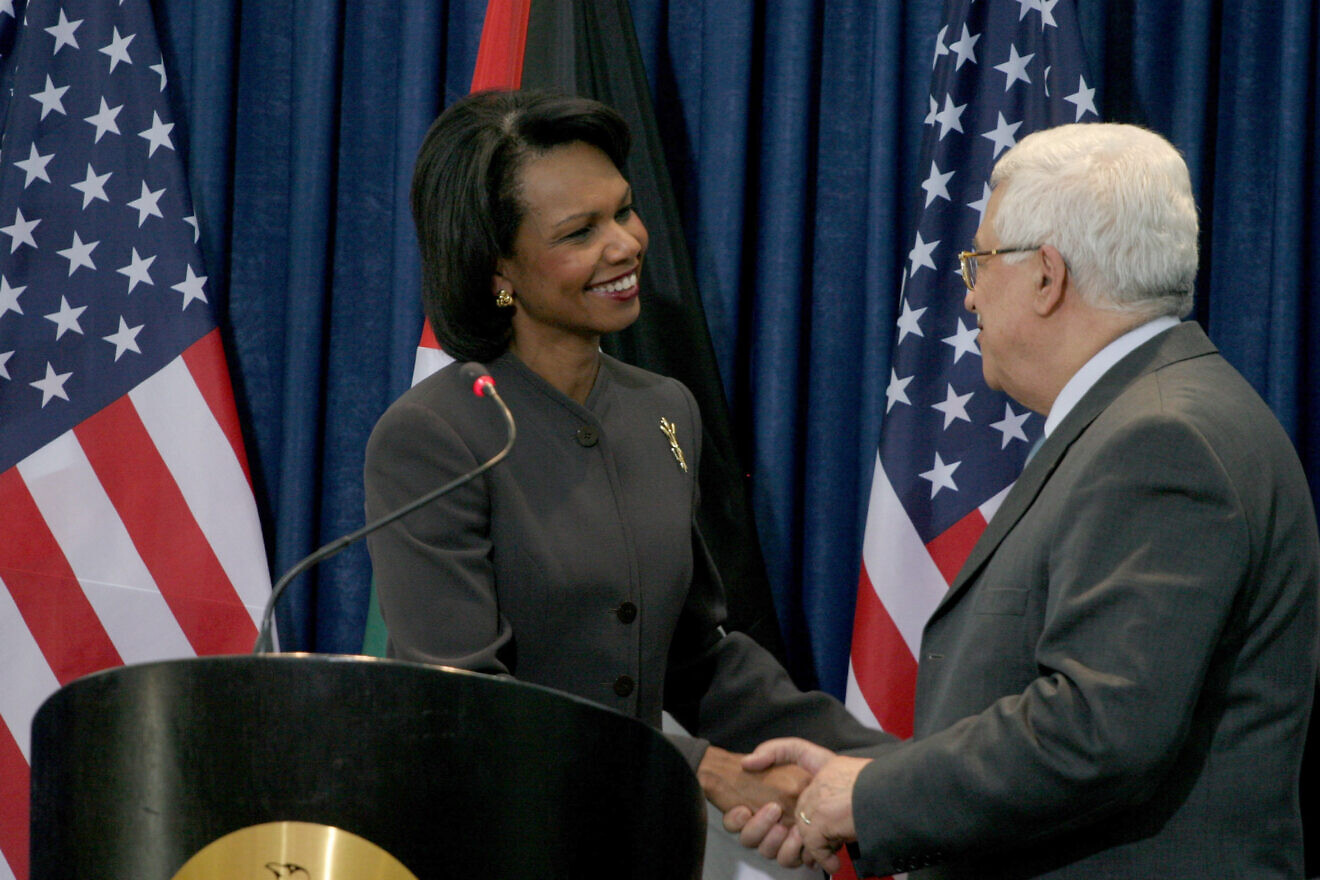The administration of President George W. Bush should have insisted Palestinian Authority chief Mahmoud Abbas disarm Hamas ahead of the 2006 P.A. legislative election that the terrorist group won, former Secretary of State Condoleezza Rice said in an interview over the weekend.
“In retrospect, yes, I think you don’t want armed groups to be able to run in an election,” Rice told PBS “Firing Line” anchor Margaret Hoover on Saturday. “When you think about it, it is, of course, an unfair advantage if you’re armed with a militia and you run in an election.”
The former secretary of state noted that it was the Palestinian Authority that objected to Hamas’s demilitarization before the January 2006 vote and threatened a boycott, “and then the elections wouldn’t be legitimate.
“In the future, perhaps what you do is you say, ‘All right, either you disarm now and you participate in the elections, or we have elections, and when you disarm, you can participate in following elections.’ And in retrospect, I think that’s probably what should have been done,” Rice acknowledged in the 25-minute “Firing Line” interview.
Fmr. Sec. of State @CondoleezzaRice reflects on what she'd "do over" with the 2006 elections brought #Hamas to power in #Gaza.
In retrospect, she says the U.S. should have prohibited Hamas from participating until after they disarmed.
"You don't want armed groups to be able to… pic.twitter.com/wOctmk5CrS
— Firing Line with Margaret Hoover (@FiringLineShow) October 12, 2024
While Bush urged Abbas to confront “armed gangs” before the vote, he stopped short of saying that Ramallah should prevent terrorist groups from participating, despite a request by 70 senators to do so.
Hamas subsequently defeated Abbas’s Fatah faction not only in Gaza but also in traditional Fatah strongholds such as Ramallah, as well as in eastern Jerusalem. This came as a shock to the P.A.’s Western backers, who had expected a Fatah victory in line with the 2005 presidential vote.
Rice told The New York Times on Jan. 29, 2006, that she didn’t “know anyone who wasn’t caught off guard by Hamas’s strong showing.”
In Saturday’s PBS interview, Rice said that the Hamas-led Oct. 7, 2023, terrorist massacre in the northwestern Negev was “one of the most brutal attacks that I think I’ve seen,” adding that none of the five “Gaza crises” she experienced as secretary of state “looked like this.”
“My hope is that as Israel thinks about what it has already achieved, that it thinks also about the future of Israel, a country that has a marvelous and vibrant economy and needs its soldiers back, and its reservists back in that economy, a country that was on the road to normalization with Saudi Arabia, which would change the face of the Middle East, thanks to the Abraham Accords, which were extraordinary,” Rice said.
She said a ceasefire deal in Gaza “makes more sense” than a truce with Hezbollah terrorists in Lebanon “at this point,” urging Israel to “begin to do something about the humanitarian crisis for the Palestinians.
“I think the war against Hezbollah is a little different. Hezbollah holds Lebanon hostage. And so this is first and foremost about eliminating the threat or diminishing the threat of Hezbollah to Israel. And they’re doing an amazing job of doing so,” she said of the military campaign aimed at making it safe for displaced Israelis to return to their homes in the country’s north.
Regarding Iran’s Oct. 1 mass ballistic missile attack on Israel, Rice urged the Jewish state to “take a look and say, where are we, what have we achieved, and let’s not overreach.” She added that this is “a conversation that’s worth having with the Israelis quietly.
“I would double down on the pressure on the Iranian regime,” Rice said. “And one might think about at this point whether the Houthis [in Yemen], who are international outlaws for what they’ve been doing to shipping, ought to join the party with Hezbollah and Hamas in terms of some of the destruction of their capability.”


























